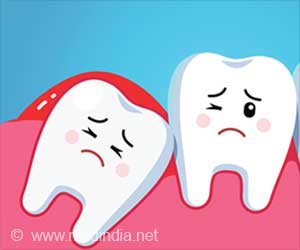A new study has found that taking good care of teeth and gums may be crucial in preventing heart valve infection.
Heart valve infections can be prevented by maintaining good dental hygiene, a new study has found.
Researchers at the Carolinas Medical Center, Charlotte, N.C. examined in 290 dental patients whether daily dental activities such as brushing were as likely as major dental procedures such as tooth extraction to cause infective endocarditis (IE), a dangerous infection of the lining of the heart or heart valve that can occur when bacteria enter the bloodstream.As expected, researchers found bacteria in the blood more often with the two extraction groups than with the brushing group. However, the incidence of bacteremia from brushing was closer to an extraction than expected.
"This suggests that bacteria get into the bloodstream hundreds of times a year, not only from tooth brushing, but also from other routine daily activities like chewing food," said the study's lead author Peter Lockhart, D.D.S.
In 2007, the American Heart Association modified its recommendation that preventive antibiotics be used prior to most dental procedures for the great majority of those at risk for infective endocarditis (IE) - a rare but life-threatening infection of the lining of the heart or heart valve that can occur when bacteria enter the bloodstream. The association now recommends preventive antibiotics only for patients at the highest risk for a bad outcome from IE.
In this double-blind, placebo-controlled study, researchers sought to determine if daily dental activities like tooth brushing posed as much risk for IE as major dental procedures (e.g., tooth extractions) for which preventive antibiotics might be prescribed. Researchers drew blood from each patient a total of six times - before, during and after these interventions - and analyzed the samples for bacterial species that are associated with IE.
They found that bacteria enter the bloodstream in most patients early on during a dental extraction or tooth brushing, and that bacteria can still be found in the blood as long as an hour after these procedures in a small number of cases.
Advertisement
"For people who are not at risk for infections such as IE, the short-term bacteremia is nothing to worry about. If you stop oral hygiene measures, the amount of disease in your mouth goes up considerably and progressively and you'll have far worse oral disease.
Advertisement
"The incidence of IE-related bacteremia from all blood draws was 23 percent in the tooth-brushing group, 33 percent in the extraction plus antibiotic group, and 60 percent for the extraction-placebo group," Lockhart said. The researchers therefore found that amoxicillin significantly decreased the incidence of bacteremia from an extraction but did not eliminate it altogether," he added.
He further explained that the highest incidence of positive IE-related bacterial cultures occurred within five minutes of all three procedures, with the majority (93 percent) of patients with bacteria in the blood experiencing the condition for less than 20 minutes after the procedures. Only 5 percent of the extraction-placebo group and 2 percent of the brushing group still had bacteria in the blood at one hour.
"The human mouth is colonized by a larger variety of bacteria than any other body area, and many of the bacterial species in the mouth that cause disease are found in the periodontal pocket (below the gum line) adjacent to the teeth," said Lockhart, adding that some of those species have been associated with IE.
"Bacteria commonly gain entrance to the circulation through ulcerated gingival (gum) tissue surrounding the teeth, but oral hygiene reduces gingival disease and reduces that risk."
The study is published in Circulation: Journal of the American Heart Association.
Source-ANI
RAS/L










